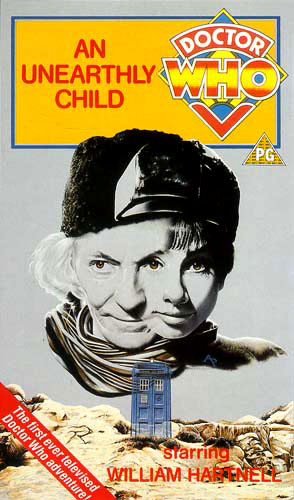
David Bowie and Elvis Costello each confront their respective Doppelgängers:
48. David Bowie, “Width of a Circle” (1970):
49. Elvis Costello, “My Science Fiction Twin” (1994):

David Bowie and Elvis Costello each confront their respective Doppelgängers:
48. David Bowie, “Width of a Circle” (1970):
49. Elvis Costello, “My Science Fiction Twin” (1994):
As many of my readers will know, the original 1963 pilot for Doctor Who, “The Unearthly Child,” exists in two versions. The original version was reshot because of several complaints by the powers-that-BBC, notably:
Viewing the two episodes in tandem I’ve also noticed the following specific differences (not a complete list!):
 In the aired version, the Doctor explains how the TARDIS can be bigger on the inside by comparing it to showing a large building on a small television screen; and when Ian and Barbara don’t understand, he compares their minds to the “savage mind” of a “Red Indian” when first confronted with a locomotive. None of this had been in the unaired version.
In the aired version, the Doctor explains how the TARDIS can be bigger on the inside by comparing it to showing a large building on a small television screen; and when Ian and Barbara don’t understand, he compares their minds to the “savage mind” of a “Red Indian” when first confronted with a locomotive. None of this had been in the unaired version.Anyway, if you too want to watch the shows in conjunction in order to compare them (either watching one just before the other, or else cutting back and forth between the two), you can do so conveniently here, as I’ve embedded them both on the same page. (The BBC tends to get these taken down, so watch them while you can!)
The unaired version:
The aired version:
Incidentally, the Doctor’s pseudonym in this episode, “I. M. Foreman,” might seem to be a reference to his status as champion of the Earth and of humanity (“I am for man”); but that status wasn’t yet established at this point – indeed, he seems rather hostile to humans (and two episodes later would be trying to bash an injured caveman’s head in with a rock). So I think it’s probably just a coincidence.

In the original Norse myths, Thor disguises himself as a woman, specifically a bride, in order to sneak into the giants’ fortress.
Still more radically, in order to lure a male horse away from its owner, Loki transforms himself into a female horse in heat, allows himself to be impregnated, and subsequently gives birth to a magical horse.
In the Nibelungenlied, Brünnhilde is physically stronger than any man, and can be defeated only by magical trickery.
Just a reminder, for those complaining that Marvel is ruining the macho purity of Norse mythology.

44. David Bowie, “Cat People (Putting Out Fire)” (1982):
From the soundtrack of the 1982 remake of the 1942 movie about a lineage of women who transform into panthers:
45. Devo, “Jocko Homo” (1978):
And this song is a tribute to H. G. Wells’ novel Island of Dr. Moreau, about a scientist who operates on animals to transform them into humans. (The song’s refrain is a reference to the litany recited by the uplifted animals in the book: “Not to go on all-fours; that is the Law. Are we not Men? Not to suck up Drink; that is the Law. Are we not Men?”)
Another version:

Handy household robots ….
42. David Bowie, “Little Toy Soldier” (1967):
43. Daft Punk, “Technologic” (2005):

Two songs about trying to survive after the apocalypse:
40. David Bowie, “Sunday” (2002):
41. Talking Heads, “Life During Wartime” (1979):
| M | T | W | T | F | S | S |
|---|---|---|---|---|---|---|
| 1 | ||||||
| 2 | 3 | 4 | 5 | 6 | 7 | 8 |
| 9 | 10 | 11 | 12 | 13 | 14 | 15 |
| 16 | 17 | 18 | 19 | 20 | 21 | 22 |
| 23 | 24 | 25 | 26 | 27 | 28 | |